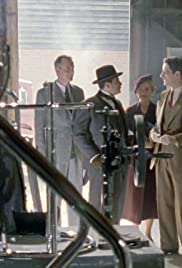
DEAD MAN’S MIRROR
UK, 1993, 50 minutes, Colour.
David Suchet, Hugh Fraser, Philip Jackson, Iain Cuthbertson, Emma Fielding, Fiona Walker, Zena Walker, Richard Lintern, Jeremy Northam, Tushika Bergen.
Directed by Brian Farnham.
The mirror of the title is in auction, Poirot bidding, but outbidden and rather irritated, especially with the manner of the buyer – who then invites Poirot to come to his house to investigate a fraud. Meantime, the audience has seen a young man and woman secretly marrying, and being observed by an older woman.
Poirot and Hastings go to the mansion of the bidder, finding an entrepreneur with the arts, meeting his research assistant, Miss Lingard. The entrepreneur’s nephew, Hugo, an early role for Jeremy Northam, is in love with a young woman, Susan, Tahika Bergen. In the house is the entrepreneur’s wife, who is caught up in the occult, hearing voices from an ancient Egyptian, prophesying that there would be a death in the house. There is also the entrepreneur’s ward, Ruth, whom the audience has seen at the wedding – and her husband is an architect whose company the entrepreneur wants investigated by Poirot.
The entrepreneur, Iain Cuthbertson, is a most unpleasant demanding character and is found dead, seeming suicide, but inconsistencies with his left hand with the gun, the seeming bullet hole in the mirror that Poirot had wanted. With some explanations about the ward, the entrepreneur wanting his nephew to marry her, a signed will, an unsigned will, audiences may well quickly work out who the murderer is and why. However, there is the usual unmasking by Poirot – and some complications with the how the murder was done.
1. The popularity of Agatha Christie mysteries, the television series, David Suchet as Poirot? Assisted by Hastings and Chief Inspector Japp?
2. The title, the opening with the auction, Poirot’s determination, £100? The rivalry, outbidding? His dislike of the buyer, the discussions, the invitation to his house? Poirot irritated? deciding to go?
3. The impact of Gervaise Chevenix? A haughty manner, art dealing? His office, the range of paintings, Miss Lingard as his investigator? His manner, dealing with his family? His will, the change of will, unsigned? His death?
4. Poirot and Hastings, the encounter with Hugo, and the drive to his factory, his skill and inventions, need for money? Chevenix his uncle? His demand that Hugo marry Ruth? Susan on the train, the conversations with Poirot, her hatred of Chevenix? Her wanting to marry Hugo?
5. At the estate? The encounter with all the characters? The rule of the gongs? Some hearing the first gong, others not, including Poirot? Chevenix late for the meal? His wife and her concern – and her occult practices, hearing the voices of the Egyptian, that there would be death?
6. The discovery of the body, shot, the locked room? The gun in the left-hand? The mirror with the hole? Poirot noting the inconsistencies? The loose latch on the window? Ruth and her search for her brooch, the footsteps in the mud, the mud on her dress as all were assembled?
7. The audience having seen the architect marry Ruth, secretly, removing her ring? Observed by Miss Lingard? The secrecy, her intention to tell Chevenix?
8. Chevenix and his asking Poirot to investigate the fraud, his suspicions of the architect?
9. The Chief Inspector arriving, the quick conclusion that the case was suicide? Listening to Poirot, raising other questions?
10. The visit to the architectural firm, the shabby building, the fire, the rescue of the architect, the explosion? His going to hospital? His ambitions, his partners stealing the money? His setting the fire? Ruth coming to visit him, the revelation about the marriage?
11. The visit to Miss Lingard, her contemplating the picture of the mother with the child?
12. The assembly? The explanations by the butler? Poirot and his making a case for all of them to be guilty? Ruth seen as guilty, being arrested?
13. The setup, the mysterious voice, the widow and her following the voice? The exposure of Miss Lingard?
14. The previous explanation about Ruth, the typist mother, Chevenix’s brother, Chevenix taking her as his ward, his wanting her to marry Hugo? Miss Lingard revealed as the
mother?
15. Once again, the least likely suspect, but sufficient clues about Miss Lingard being the mother? But the intricacy of the issue of the locked door and her escape, the bullet hitting the gong, the difficulties with the time situation, the bullet and the cufflink?